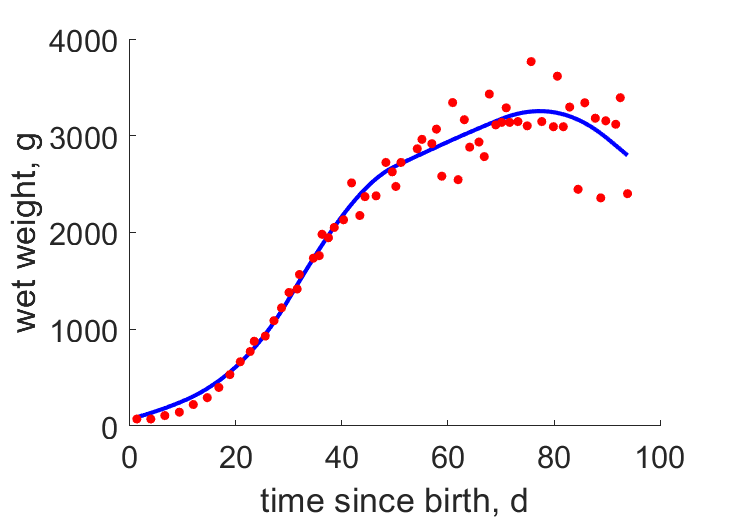Predictions & Data for this entry
| Model: std | climate: BSh, BWh | migrate: | phylum: |
| COMPLETE = 2.5 | ecozone: TPa | food: biCi, biCvr | class: |
| MRE = 0.014 | habitat: 0iTi | gender: Dg | order: |
| SMSE = 0.002 | embryo: Tnwf | reprod: O | family: |
Zero-variate data
| Data | Observed | Predicted | (RE) | Unit | Description | Reference |
|---|---|---|---|---|---|---|
| ab | 39 | 39.1 | (0.002681) | d | age at birth | avibase |
| tx | 73 | 73.05 | (0.0006189) | d | time since birth at fledging | ADW |
| tp | 219 | 219.2 | (0.001119) | d | time since birth at puberty | guess |
| tR | 730 | 730 | ( 0) | d | time since birth at 1st brood | guess |
| am | 2.555e+04 | 2.563e+04 | (0.003196) | d | life span | avibase |
| Wwb | 70 | 69.96 | (0.0005426) | g | wet weight at birth | WitmLaGr2020 |
| Wwi | 3500 | 3502 | (0.0005233) | g | ultimate wet weight | avibase |
| Wwim | 4000 | 3990 | (0.002432) | g | ultimate wet weight for males | avibase |
| Ri | 0.001826 | 0.001832 | (0.003167) | #/d | maximum reprod rate | avibase |
Uni- and bivariate data
| Data | Figure | Independent variable | Dependent variable | (RE) | Reference |
|---|---|---|---|---|---|
| tW |  | time since birth | wet weight | (0.06898) | WitmLaGr2020 |
Pseudo-data at Tref = 20°C
| Data | Generalised animal | Bucorvus abyssinicus | Unit | Description |
|---|---|---|---|---|
| v | 0.02 | 0.03104 | cm/d | energy conductance |
| p_M | 18 | 306.4 | J/d.cm^3 | vol-spec som maint |
| k_J | 0.002 | 0.01236 | 1/d | maturity maint rate coefficient |
| k | 0.3 | 0.2957 | - | maintenance ratio |
| kap | 0.8 | 0.9936 | - | allocation fraction to soma |
| kap_G | 0.8 | 0.7995 | - | growth efficiency |
| kap_R | 0.95 | 0.95 | - | reproduction efficiency |
Discussion
- scaled functional response turned out to vary, which has been implemented
- males are supposed to differ from females by {p_Am} only
- mod_1: v is reduced; tW re-digitized
- mod_2: Pseudo-data point k is used, rather than k_J; Data set tp and parameter t_R are added, the latter replacing clutch interval t_N. Postnatal T is based on PrinPres1991, see get_T_Aves. See further the revision page, theme puberty
Bibliography